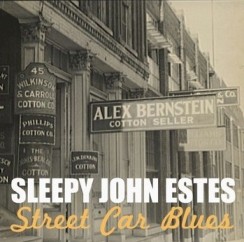Sleepy John Estes - Street Car Blues (1999)
Sleepy John Estes - Street Car Blues (1999)

1. Drop Down Mama
2. Stop That Thing
3. Drop Down
4. Someday Baby Blues
5. Brownsville Blues
6. Milk Cow Blues
7. Easin' Back To Tennessee
8. Street Car Blues
9. Little Laura Blues
10. Poor Man's Friend
11. Raildoad Police Blues
12. Working Man Blues
13. Jailhouse Blues
14. Lawyer Clark Blues
15. Mary Come Home
16. Airplane Blues
17. Fire Department Blues
18. Everybody Oughta Make A Change
19. Jack And Jill Blues
20. Liquor Store Blues
21. Floating Bridge
22. Mailman Blues
23. Mr. Tom's Blues
24. Need More Blues
25. Hobo Jungle Blues
26. Time Is Drawing Near
Big Bill Broonzy called John Estes' style of singing "crying" the blues because of its overt emotional quality. Actually, his vocal style harks back to his tenure as a work-gang leader for a railroad maintenance crew, where his vocal improvisations and keen, cutting voice set the pace for work activities. Nicknamed "Sleepy" John Estes, supposedly because of his ability to sleep standing up, he teamed with mandolinist Yank Rachell and harmonica player Hammie Nixon to play the house party circuit in and around Brownsville in the early '20s. The same team reunited 40 years later to record for Delmark and play the festival circuit. Never an outstanding guitarist, Estes relied on his expressive voice to carry his music, and the recordings he made from 1929 on have enormous appeal and remain remarkably accessible today. Despite the fact that he performed for mixed black and white audiences in string band, jug band, and medicine show formats, his music retains a distinct ethnicity and has a particularly plaintive sound. Astonishingly, he recorded during six decades for Victor, Decca, Bluebird, Ora Nelle, Sun, Delmark, and others. Over the course of his career, his music remained simple yet powerful, and despite his sojourns to Memphis and Chicago he retained a traditional down-home sound. Some of his songs are deeply personal statements about his community and life, such as "Lawyer Clark" and "Floating Bridge." Other compositions have universal appeal ("Drop Down Mama" and "Someday Baby") and went on to become mainstays in the repertoires of countless musicians. One of the true masters of his idiom, he lived in poverty, yet was somehow capable of turning his experiences and the conditions of his life into compelling art. ---Barry Lee Pearson, ampya.com
download: uploaded anonfiles mega 4shared mixturecloud yandex mediafire ziddu
Last Updated (Wednesday, 26 June 2013 12:00)








